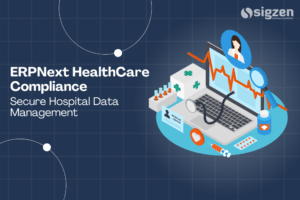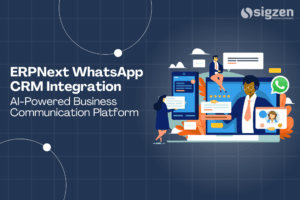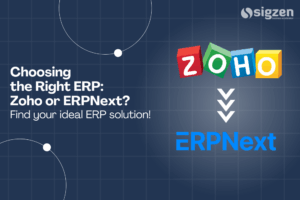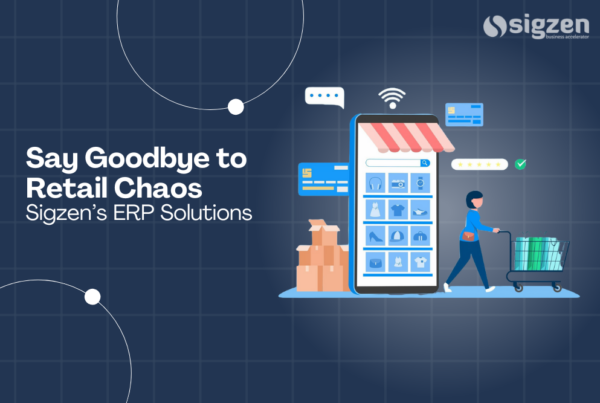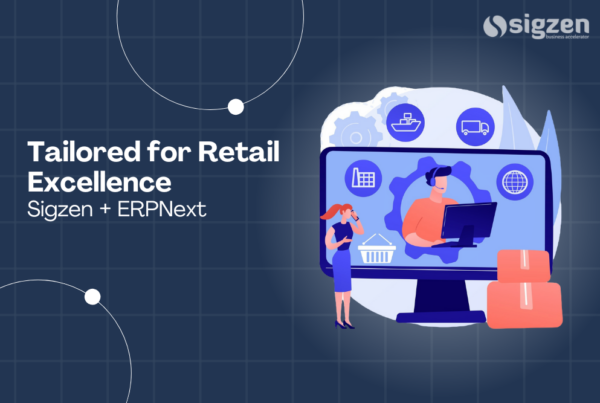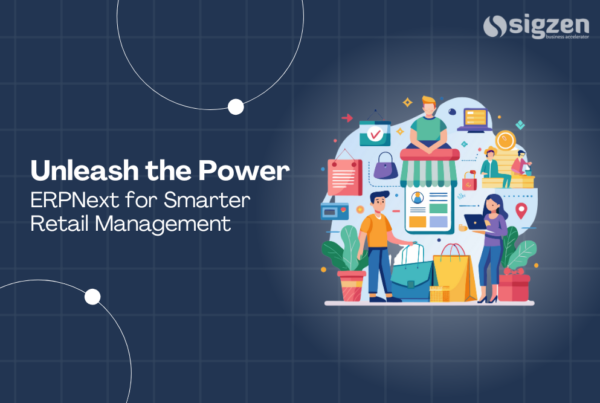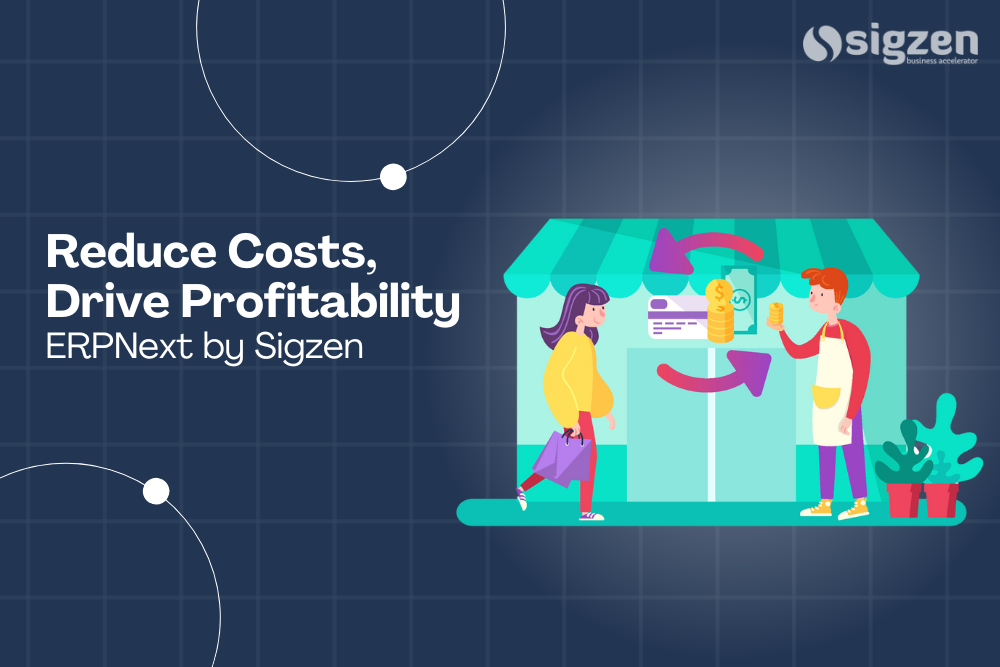
Introduction: Revolutionizing Retail Operations with ERPNext
Retail businesses operate in a highly competitive market, where efficiency and cost management are key to profitability. Managing diverse operations like inventory control, sales, customer service, and financial accounting can become overwhelming without an integrated system. Implementing ERP for Retail, such as ERPNext by Sigzen, offers a streamlined approach to managing operations, reducing costs, and improving financial performance.
This article explores the financial advantages of adopting ERPNext in retail, focusing on how it integrates ERP accounting, enhances finance management for retail, and optimizes operational efficiency. From inventory control to real-time financial insights, ERPNext transforms retail operations for sustainable growth.
Challenges in Managing Retail Finances
1. Fragmented Financial Processes
Retailers often rely on disconnected systems for sales, inventory, and accounting, resulting in inefficiencies and data inaccuracies.
2. Lack of Real-Time Insights
Delayed financial reporting hinders decision-making and may lead to lost opportunities or unaddressed inefficiencies.
3. Inventory Mismanagement
Excess inventory or stockouts impact both operational costs and customer satisfaction, affecting the bottom line.
4. Complex Tax Compliance
Retail businesses need to comply with multiple tax regulations, which can be challenging without automated tools.
5. Rising Operational Costs
Inefficient workflows, manual data entry, and lack of visibility into resource allocation contribute to escalating costs.
How ERPNext Reduces Operational Costs in Retail
1. Streamlined Accounting and Finance
ERPNext simplifies accounting and finance for retail by centralizing all financial activities. Key features include:
- Automated Bookkeeping: Eliminate manual data entry with real-time recording of transactions.
- Comprehensive Financial Reports: Generate accurate profit and loss statements, balance sheets, and cash flow reports instantly.
- GST and Tax Compliance: Ensure accuracy in tax calculations and filing with automated tools.
Explore ERPNext’s accounting features for retail businesses.
2. Efficient Inventory Management
Managing inventory effectively is crucial for reducing costs and ensuring customer satisfaction. ERPNext provides:
- Real-Time Stock Tracking: Monitor inventory levels across multiple locations to prevent overstocking or stockouts.
- Automated Replenishment: Set reorder points for timely procurement, avoiding unnecessary holding costs.
- Batch and Serial Number Tracking: Ensure traceability and reduce losses due to misplaced or expired products.
Learn more about ERPNext’s inventory management capabilities.
3. Integrated ERP Accounting
With ERP accounting software, retailers can gain real-time visibility into their financial health:
- Cost Center Management: Allocate costs to specific departments or projects for better budget control.
- Expense Tracking: Monitor operational expenses and identify areas for cost optimization.
- Seamless Payment Integration: Link with payment gateways to streamline transactions and reconciliations.
Understand more about ERP accounting features here.
4. Improved Supply Chain Management
ERPNext optimizes supply chain management for retail to reduce costs and improve efficiency:
- Vendor Management: Evaluate vendor performance to negotiate better terms and ensure timely deliveries.
- Purchase Requisitions: Automate procurement processes, minimizing delays and human errors.
- Demand Forecasting: Use historical data to predict demand and align supply chain activities.
Discover how ERPNext simplifies purchase management.
5. Enhanced Employee Productivity
By automating repetitive tasks and improving workflow efficiency, ERPNext helps retailers maximize workforce productivity:
- Task Automation: Eliminate manual processes like invoice generation and stock updates.
- Role-Based Access: Streamline workflows by assigning roles and responsibilities within the ERP system.
- Training and Support: Use ERP’s intuitive interface to reduce training time and improve user adoption.
Financial Benefits of ERPNext in Retail
1. Lower Administrative Costs
- Automation reduces reliance on manual processes, saving time and labor costs.
2. Improved Cash Flow Management
- Real-time insights into receivables and payables help businesses maintain healthy cash flow.
3. Reduced Inventory Costs
- Optimize inventory levels to minimize carrying costs and avoid obsolescence.
4. Enhanced Profitability
- With better cost management and operational efficiency, retailers can achieve higher profit margins.
5. Scalability
- Support business growth without proportional increases in operational costs.
Real-World Case Study: ERPNext in Action
Challenge: A mid-sized retail chain faced challenges with managing inventory, reconciling accounts, and controlling operational expenses.
Solution: Sigzen implemented ERPNext, resulting in:
- 25% reduction in operational costs through automated workflows and better inventory management.
- 30% improvement in cash flow due to real-time financial tracking.
- 20% increase in employee productivity by automating repetitive tasks.
Request a demo from Sigzen to see ERPNext in action.
Understanding ERP Accounting in Retail
What is an ERP System in Accounting?
ERP systems in accounting integrate financial data with other business processes, providing a unified platform for tracking and managing transactions. Benefits include:
- Accurate financial reporting.
- Real-time visibility into financial health.
- Streamlined tax compliance and auditing.
Key Features of ERP Accounting Software
- General Ledger Management: Maintain accurate and up-to-date records.
- Accounts Payable and Receivable: Automate invoicing and payments for faster processing.
- Budgeting and Forecasting: Plan and monitor financial performance with predictive analytics.
Why ERPNext is the Best ERP for Retail Businesses
- Customization: Tailor modules to meet specific retail needs.
- Affordability: Lower upfront costs compared to traditional ERP solutions.
- Cloud-Based Accessibility: Manage operations from anywhere with internet access.
- User-Friendly Interface: Simplify training and adoption for retail employees.
- Comprehensive Features: Integrate accounting, inventory, sales, and customer management in one system.
Learn why Sigzen is a trusted provider of ERP solutions for retail.
Future Trends in Retail ERP Systems
1. AI-Driven Insights
- ERPNext incorporates AI tools for better demand forecasting, customer segmentation, and inventory optimization.
2. Omni-Channel Integration
- Retailers can manage online and offline sales seamlessly with ERPNext’s omni-channel support.
3. Mobile ERP
- Access ERP features on smartphones and tablets for greater flexibility.
4. Sustainability Tracking
- Monitor and report on sustainable practices, such as waste reduction and energy consumption.
Best Practices for Implementing ERP in Retail
- Define Clear Goals: Identify key challenges and objectives to ensure the ERP system aligns with your business needs.
- Engage Key Stakeholders: Involve finance, sales, and operations teams in the selection and implementation process.
- Ensure Data Accuracy: Clean and organize existing data before migrating to the ERP system.
- Partner with Experts: Work with experienced providers like Sigzen for a smooth implementation process.
Conclusion: Drive Financial Success with ERP for Retail
Managing retail operations effectively requires a system that integrates every aspect of the business, from inventory and sales to accounting and customer management. By adopting ERP for Retail, businesses can reduce operational costs, improve financial performance, and stay competitive in a fast-evolving market. ERPNext by Sigzen is the perfect partner for achieving these goals, offering robust features and seamless integration tailored to the retail industry.
Ready to revolutionize your retail business? Request a demo from Sigzen today!
